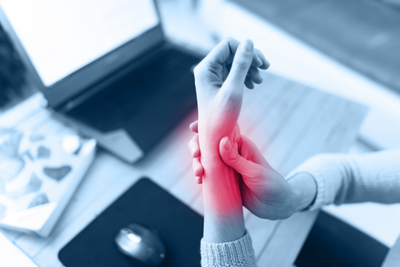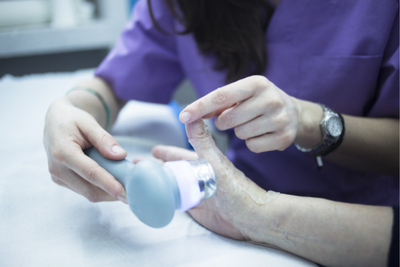Repetitive Strain Injury is a very painful and debilitating condition, which can result in permanent damage if left untreated. It is often described as a pain, ache, soreness or stiffness in the upper limbs and can affect people of all ages.
What is RSI?
Repetitive Strain Injuries (RSI), otherwise known as Occupational Overuse Syndrome (OOS), is usually an injury of the upper limbs, including fingers, hands, wrists and elbows. It is an overuse injury, caused by repetitive motions that causes a build up of damage to muscles, tendons and nerves through repeated microtrauma.

Symptoms can include swelling, pain and weakness in the affected areas and joints. These tendons become overworked and inflamed by repeating tasks such as playing a musical instrument, working on a keyboard or device, or working on an assembly line.
Causes of RSI
The main causes of RSI include
- Carrying out repetitive tasks for long periods without sufficient rest
- Poor posture or tasks that require awkward body positioning
- Poor working environment
RSI or OOS are some of the most common causes of work related injuries.
Signs and Symptoms
It’s vital to recognise the early signs and symptoms of RSI or OOS, as early treatment can greatly assist with recovery.
RSI or OOS is usually associated with the hand, fingers, wrists, elbows, shoulders, back or neck, however any part of the body can be affected.
Symptoms can vary depending on the injury site, severity and person, but common symptoms include
- Swelling
- Muscle weakness or cramping
- Pain, burning, aching and tenderness
- Numbness or tingling
- Stiffness and restricted mobility
- Referred pain in other parts of the body
The specific pain or symptoms can sometimes be hard to pinpoint, but will often be diagnosed as golfers/tennis elbow, tendonitis, cellulitis or carpal tunnel syndrome.

Occupations and Employees most at risk
Many occupations involve repeating the same action each and every day. Manually tasks that are fast and repetitive, or involve you working in a set or awkward position for long periods can trigger RSI or OOS. These can include
- Construction workers and Tradies
- Process workers
- Office workers
- Medical staff
- Hairdressers
- Cleaners
- Drivers
- Musicians
- Sportspeople
- Parents and Childcare workers
How to Avoid or Prevent RSI in future
If you do repetitive activities or work, and are suffering from RSI, then it is important to recognise what’s causing the problem and be proactive about reducing the risk in future. This will assist with the chronicity of the injury, increase results from treatment and reduce time away from your activities or work.
Regular rest is often the best cure.
Making changes to your workplace design and practices can reduce the risk, and can alleviate or even prevent the condition. Improvements can include
- Using appropriate equipment that conform to the body
- Creating a more ergonomic workspace
- Working at a realistic pace
- Working in a way that doesn’t require repeated and constant bending, stretching, or twisting
- Taking regular breaks to move around
- Breaking up repetitive manual tasks
Treatment Options for RSI
Early intervention is key! It is very important not to ignore the symptoms. Initially pain may be minimal and only felt when doing a specific task, however if ignored, the symptoms will escalate and pain may be felt in joints, muscles and tendons when at rest also.
The good news is that RSI is very receptive to treatment in its early stages.
Rest is usually the first recommendation.
Regular treatment from a Physiotherapist, Massage Therapist or Acupuncturist will also help greatly. There are a range of successful techniques to try with the overall goal being to release tension and prevent further stress on the body.
In some cases treatment may include an MRI scan to detect any damage and cortisone injections.

Where to Get Help!
SPHC have qualified and highly experienced therapists to help with RSI or OOS through Physiotherapy, Acupuncture and Massage Therapy. Contact us today for an individual assessment from one of our Physios and a treatment plan will be created to suit your individual needs.
Please call our friendly team for further advice on 3869 1099 or BOOK ONLINE.

